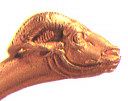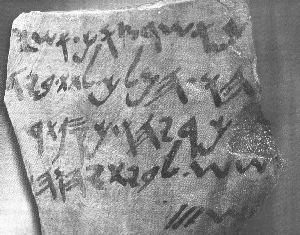
site map
Golden Fleece > Jehovah
craftsman's art and music's measure
for thy pleasure all combine.
Jehovah
introduced into the English language by Tyndale
William Tyndale (ca. 1494-1536) was the first English translator to draw directly from Hebrew and Greek texts, and the first to take advantage of the new medium of print. Tyndale introduced new words into the English language including; Jehovah (from a transliterated Hebrew construction in the Old Testament; composed from the Tetragrammaton YHWH and the vowels of adonai: YaHoWaH)
After the Babylonian Exile in the 6th century B.C. Adonai, "My Lord" and Elohim "God" were gradually substituted for YHWH. In some instances, Adonai was added after YHWH to give YHWH Adonai, which was subsequently translated as "Lord God".

This ostracon, or inscribed potsherd contains the oldest complete extra Biblical mention of the House (or Temple) of Yahweh (LBYT YHWH) ever found. On this ostracon (dated to the ninth to seventh century B.C.), no word divider or dot separates LBYT and YHWH. The phrase unmistakably means "House (or Temple) of Yahweh." This translation strengthens the reading of BYT DWD on the Tel Dan inscription, which also lacks a word divider, as "House of David." This ostracon thus supports the understanding of the Tel Dan inscription as the first extra Biblical mention of King David." - Biblical Archaeology Review, Nov./Dec. 1997, Vol. 23, No. 6, p. 30 (p. 28-32)
The true pronunciation of the name YHWH was never lost. Several early Greek writers of the Christian Church testify that the name was pronounced Yahweh. In the early period of the Second Temple the name YHWH was still in comon use, as may be learned from such proper names as Jehohanan, or from liturgical formulas, such as Halelu-Yah. At the beginning of the Hellenistic era, the use of the Name was reserved for the Temple. The priests were allowed to pronounce YHWH at the benediction only in the Temple; elsewhere they were obligated to use Adonai. Pronunciation of YHWH by the Temple priests also gradually fell into disuse. From the time Simon the Just died, the priests refrained from blessing the people with the name, YHWH. They pronounced it indistinctly, or they mouthed or mumbled it.
It is possible to determine the historical pronunciation of YHWH from Exodus 3:14 where YHWH is derived from HWH. This passage is decisive for the pronunciation "Yahweh"; for the etymology was undoubtedly based on the known word. For the final syllable the analogy of verbal forms ending in "weh" renders it exceedingly probable that the original pronunciation was "weh". The Hebrew names Yehonathan or Yonathan (Jonathan) and Hizkiyahu or Hiskiyah (Hezekiah) are representative of names compounded with the divine name, and the Assyrian pronunciation indicates the correctness of the Massoretic pointing given Hezekiah's name. This shows clearly and decisively the pronunciation "yah" for the first syllable.
Speak to Aaron and his sons, saying; This is how you are to bless the children of Israel. Say to them;
Yahweh bless you and keep you.
Yahweh make His face shine upon you and be merciful to you.
Yahweh lift up His countenance upon you, and give you peace.
So they will put my name on the children of Israel, and I will bless them.
Numbers 6:23-27
Then Boaz came from Bethlehem [Bayit-Lechem], and he said to the harvesters; Yahweh be with you! And they answered him; Yahweh bless you! Ruth 2:4
The name of YHWH is for the faithful a never failing source of confidence, power and joy. Like other Hebrew proper names, the name of YHWH is more than a mere distinguishing title. It represents the Hebrew conception of the divine nature or character and of the relation of YHWH to His people. It represents YHWH as He is known to His worshipers, and stands for all those attributes which He bears in relation to them and which are revealed to them through His activity on their behalf.
Yahweh is our shepherd; we shall not want.
He makes us to lie down in green pastures. He leads us beside the still waters;
Yahweh restores our life; He leads us in the paths of righteousness for His Name's sake.
Yes, though we walk through the valley of the shadow of death, we will fear no evil; for You are with us. Your rod and Your staff, they comfort us.
You prepare a table before us in the presence of our enemies. You anoint our heads with oil. Our cups overflow.
Surely righteousness and mercy will follow us all the days of our lives; and we will dwell in The House of Yahweh (Bayit Yahweh) forever!
Psalm 23:1-6
Moses
In Exodus 3:16, Moses is instructed, "tell them that YHWH, the God of their forefathers, the God of Abraham, Isaac, and Jacob has appeared to you . . .". Abraham first built an altar to YHWH at Shecham and then later between Bethel and Ai. Genesis 12: 4-9. The first letters of these two place names in paleo Hebrew script are described as "an ear of corn near a fall of water". When conjoined these letters are a reminder not only of the promise of YHWH to Abraham and his descendants but also the first place where Abraham called upon the name of YHWH. These two altars to YHWH are also referenced by the two pillars at the entrance of King Solomon's Temple. Jacob slept near one of these altars built by Abraham.

"Jacob went out from Beer-Sheba and traveled toward Haran. He came to a certain place and stayed the night there, because the sun had set. He took a stone from the place, put it under his head and lay down there to sleep. He dreamt that there before him was a ladder resting on the ground with its top reaching to heaven, and the angels of YHWH were going up and down on it."
"Then suddenly YHWH was standing there next him; and he said, 'I am YHWH, the God of Abraham and the God of Isaac. The land on which you are lying I will give to you and to your descendants. Your descendents will be as numerous as the grains of dust on the earth. You will expand to the west and to the east, to the north and to the south. By you and your descendants all the families of the earth will be blessed. Look, I am with you, I will guard you wherever you go, and I will bring you back into this land, because I won't leave you until I have done what I have promised you.' " Genesis 28:10-17
Good bye
This phrase comes from God be with you. It has been shortened over the years since 16th century. Shakespeare used "God be wy you."
Copyright © 2001-2009 The Fleece. All rights reserved.